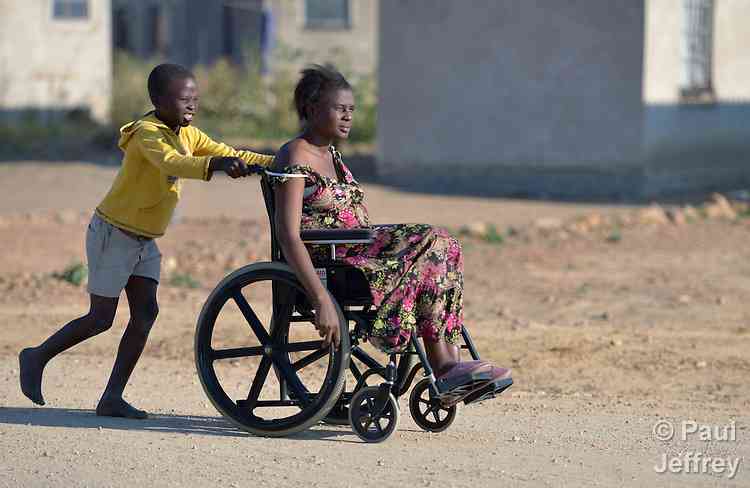
In order to determine whether a programme is reaching people with and without disabilities there is need to collect disability disaggregated data.
Disability data establishes the size, status and inequalities associated with disability.
Quality disability data is scarce, hence it affects the commitment to address issues affecting people with disabilities including the development of evidence-based policies and monitoring implementation of the Convention on the Rights of Persons with Disabilities (CRPD).
It is estimated that 15% of the world’s population have some form of disability, the largest minority group which is growing, and one can become a member at any time by accident, illness, old age or disasters.
Disability is a diverse group and the different impairments including barriers affecting access to services need to be considered.
Data for disparities in health, education and employment by persons with disabilities needs to be provided in order to improve service provision.
Article 31 of the CRPD, highlights the need for disability statistics and data collection. Appropriate information should be collected, including statistical and research data to support the development of policies and implementation of the CRPD.
Confidentiality should be upheld, including the respect for privacy of persons with disabilities.
- New Horizon: Attitude a major barrier for achieving disability inclusion
- PWDs remembered in peace, voter education drive
- Perspectives: Importance of disability disaggregated data
- Artificial intelligence and disability
Keep Reading
The dissemination of accessible disability data to various stakeholders is important to ensure no one is left behind in programmes and interventions.
Disability data is essential in identifying the inequalities that people with disabilities face, the patterns and magnitude.
Such data is important in programme design and inclusive policy development. The 2030 agenda for sustainable development affirms the importance of disaggregating data by disability among other factors such as gender, age, income and ethnicity to ensure that no one is left behind.
Therefore, collecting disability data is important in monitoring the implementation of the Sustainable Development Goals (SDGs) and compliance to the CRPD.
It is vital in defining what has been achieved and reflecting on the gaps that remain. The collection of disability disaggregated data varies across countries.
Some of the tools used to collect disability data include the World Health Organisation (WHO) Functioning and Disability Disaggregation (FDD11) tool which captures the experiences of disability through assessing difficulties experienced in undertaking different activities associated with a health problem.
The Washington Group Short Set of Questions (WGSSQ) on disability have been widely used in Zimbabwe including a number of countries, mainly in national surveys and national census.
The six questions assess the degree to which an individual experiences difficulty in functioning in the following domains: vision, hearing, mobility, cognition, self-care and communication.
Although the use of the WGSSQ is feasible and facilitates valuable data, some of the limitations include the following: the tool does not directly address mental health functioning, the tool does not provide accurate data for children beyond the age of five years, the questions might miss people with less severe disabilities, the tool lacks detailed information to enhance social participation and access to services.
Therefore, additional tools such as the Washington Group/Unicef Child Functioning Module has been developed and implemented in identifying children with disabilities.
Experiences in collecting disability data
In the past the collection of quality comparable disability data has not been consistent with very little commitment due to lack of resources and political will.
Generally, the cost of adopting and adapting survey methodologies has been described as expensive.
Surveys conducted provide sample data and may not be representative of all persons with disabilities, however the collection of disability data in a census is more representative.
At times the data is collected but not shared or integrated into policies, systems and different levels in society.
Taking the next steps to use the data to inform decision making and policy development is key. Data privacy and security are key principles highlighted in the CRPD to observe the respect and dignity of persons with disabilities.
However, some people with disabilities prefer not to participate in surveys or disclose their health information.
Inaccessible digital information and services makes it difficult for people with disabilities to participate in surveys or data collection.
The fact that countries use different tools to collect the data, makes it difficult to compare the data and prevalence estimates.
Resources should be committed towards the collection of disability data and research.
This requires the capacity building of stakeholders to support the collection of disability disaggregated data within their programmes, systems and surveys.
An investment should be made into national data systems to promote disability inclusion.
However, after collecting disability disaggregated data, there is limited capacity and know-how to implement inclusive initiatives.
Recommendations
During emergencies or pandemics, it is still important to collect disability disaggregated data in order to determine how people with disabilities are disproportionately affected and to consider measures that provide disability specific services.
Collecting disability data will provide a broader understanding of issues, the exclusion that people with disabilities face in society and provide the basis for evidenced based advocacy.
However, the effort should not be made for the purposes of ticking the boxes, but to develop inclusive initiatives and to monitor the effectiveness of country specific or global initiatives and their desired impact on people with disabilities.
Interventions such as provision of assistive devices or reasonable accommodations have been affected by lack of data, hence providing disability data will strengthen such interventions.
Public education is important in ensuring that society does not miss out on making use of disability data in designing programmes.
Information and communication technologies should be made accessible, outlining indicators for measuring digital accessibility.
Involving people with disabilities and their organisations is key in promoting disability inclusion.
Organisations of persons with disabilities are a source of information and provide support in data collection and raising awareness with their members.
Research and data collection methods should be adapted to consider the different types of impairments and modes of communication for a more inclusive approach.
Other intersecting identities such as level of support required, age, income level and geographic location should not be overlooked.
The National Disability Policy has outlined the commitment by the government of Zimbabwe to undertake and promote research and data collection to inform evidence-based interventions and strategies with the active involvement and participation of people with disabilities and their representative organisations, ensuring ethical considerations.
Such information must be shared in accessible formats and allow for reporting mechanisms that enhance the effective implementation of the policy.
As a country we should be clear and plan for the disability data that we wish to collect taking into account the social, cultural, and economic indicators to promote equal and effective participation of people with disabilities and a positive outcome.
- *Tigere is a development practitioner and writes in her personal capacity.
- These weekly articles are coordinated by Lovemore Kadenge, an independent consultant, managing consultant of Zawale Consultants (Private) Limited, past president of the Zimbabwe Economics Society and past president of the Chartered Governance & Accountany Institute in Zimbabwe . Email - [email protected] or Mobile No. +263 772 382 852







